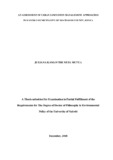| dc.description.abstract | Mavoko municipality in Machakos Municipality is facing rapid urbanization but it is not clear whether it is able to absorb the demands of this population relative to provision of sanitation services. Hence proper urban sanitation management approaches are important to realize sustainable development. The overall objective of the study was to establish the appropriateness of sanitation management approaches used. The specific objectives were to assess sanitation management approaches used by households in Mavoko Municipality, examine the sanitation management challenges faced, determine level of Residents awareness of to the existing regulatory frameworks regarding sanitation management approaches in the Municipality and assess their appropriateness. The areas covered by the study comprise of Katani, Syokimau, Athi River, Mlolongo, and Kinanie. The study relied on a cross-sectional study design with both qualitative and quantitative data collected with a purpose of achieving the study objectives. Study participants comprised of 385 residents who were interviewed based on purposive as well as simple random sampling where questionnaires were administered to standalone houses together with comprehensive housing schemes. The researcher conducted interviews relying on Key Informants drawn from the National Government, Machakos County Government, Mavoko Water and Sewerage Company as well as Export Processing Zone Authority. Analysis of quantitative data was done through the use of descriptive statistics and tables, percentages, and frequencies used in presentation. From the qualitative data, a content analysis was developed to establish thematic issues from the responses. The study established the septic tank to be the sanitation management method prevalently used, despite the clayey (black cotton soils) soils not being conducive to their use. The main challenges were inadequate trunk infrastructure for conventional sewer and storm water drainage and mandate overlaps between the main service providers while Residents awareness on prevailing policies and laws and compliance was low. There were low levels of implementation of sanitation policies with less prioritization of sanitation matters and dismal budgetary provisions. The key recommendations made include investment in trunk infrastructure for conventional sewer use, implementation and enforcement of existing regulatory frameworks in the water and sanitation sector and promotion of adoption of sanitation management approaches to ensure sustainability in the Municipality. | en_US |



